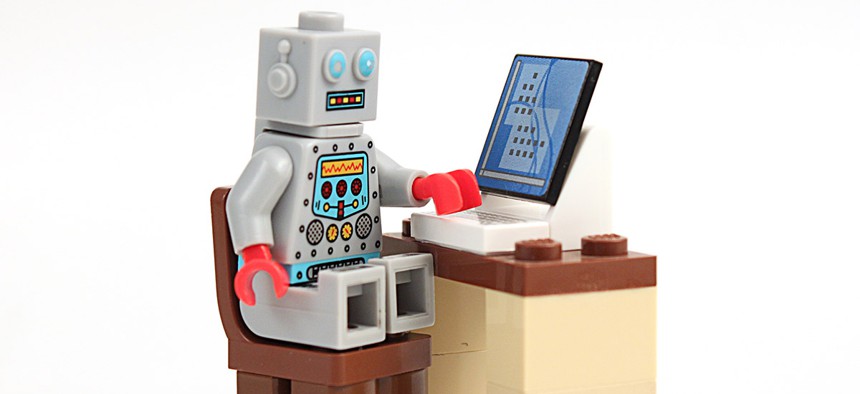Robots Could Replace White Collar Workers, Too

cjmacer/Shutterstock.com
No career is safe from the advances of artificial intelligence.
Robots have transformed the lives of tradesmen and laborers, but lawyers, architects, and doctors tend to believe that their careers are safe from the advances of artificial intelligence.
This belief is entirely wrong, according to the upcoming book, Future of the Professions: How Technology will Transform the Work of Human Experts. The authors, Richard Susskind, UK government advisor and visiting professor at Oxford Internet Institute, and his son Daniel Susskind, lecturer at Oxford University, have conducted hundreds of interviews and drawn on economic and sociological theory to reach their challenging conclusion: AI will dramatically transform the middle-class working landscape.
In the near-term, the Susskinds argue, artificial intelligence will simply accelerate the efficiency of professions. But then robots will start to take over more work, and humans will find the roles of “doctor” or “lawyer” replaced with such less glamorous-sounding titles as “empathizer,” “knowledge engineer,” or “system provider.”
“It’s hard to escape the conclusion that there will be less for people to do,” Daniel Susskind tells Quartz. “If machines and systems take on more and more tasks, as we see them doing, then it begs the question: What will be left for people?”
In their book, the Susskinds argue that the very top professionals may survive, but that number will be relatively small:
The best and the brightest will endure the longest—those who can perform tasks that cannot or ought not to be replaced by machines, and tasks that we prefer to leave in the hands of human beings. But there will not be a sufficiency of these tasks to keep armies of professionals in gainful employment.
How machines will become more professional than humans
“The perception is that a lawyer drafts a unique legal document for each client and there’s something of the craftsman to it all,” Susskind says. “Architects are perceived as leaning over their easel with a pencil, scratching away and designing buildings.” But in fact, he explains, when you divide the work of each profession into distinct tasks, many actions can be “routinized” into standard operating procedures that can be carried out by computers.
For example, retrieving legal documents, building complex constructions, marking students’ work, and diagnosing patients could all potentially be done by robots.
And not only could computers match humans at these tasks—they could be better at them than us. Susskind says that robots are able to process far more data than humans:
A new medical journal article is published every 40-something seconds. If 2% of that medical literature is relevant for a doctor, then it would take 23 hours a day to read all those journal articles. That’s just not possible. Some of these systems can scan, read, digest these huge bodies of work that would be impenetrable for ordinary people.
And even professional duties we see as distinctly “human” could be carried out by AI. Just because machines can’t feel in the way that humans can, it doesn’t mean they can’t display empathy when it’s needed for the job. Indeed, emotionally sensitive robots currently exist.
“It’s a fallacy to think that the only way a machine can perform a task is to do it the way that a human does it,” Susskind says. Meaning that robots can display empathy without necessarily feeling distinctly human emotions.
Sit back and relax: the benefits of letting machines do the work
Just because futuristic job titles such as “knowledge engineers” sound less exciting, doesn’t mean that working alongside robots will be any less fulfilling, write the Susskinds.
“The word ‘robot’ comes from the Czech word robota which means drudgery and toil. A lot of these machines are getting rid of routine tasks that professionals are happy to see go,” says Susskind. “Teachers don’t want to spend all their time marking, and these systems can free doctors up to spend more time with their patients.”
Though AI may be able to complete the bulk of professional work, Susskind says there should be a public discussion about robots’ roles in morally sensitive situations, such as issuing death sentences and turning off life support machines. “I feel deeply uncomfortable with that, but it may be that for some tasks machines can make these decisions more effectively and efficiently,” he says.
Overall, the Susskinds point out that professionals have long been “gatekeepers” that keep bodies of knowledge away from people with less resources, only disseminating it upon considerable payment. There’s a danger, they say, that technology could make new gatekeepers—but it’s also possible that expert information will be more widely shared.
And allowing machines to carry out professional work means that these services will be more accessible and affordable than ever before. There’s already evidence that this is happening, according to the Susskinds:
- In 2014, US tax authorities received 48 million electronic tax returns that were prepared using online tax software rather than a tax professional.
- An open-source building platform, WikiHouse, designed a house that could be printed and assembled for less than £50,000.
- There are more visits to WebMD every month than visits to all the doctors in the US.
- More people signed up to Harvard’s online courses in one year than attended the university in its 379 years of existence.
We may not need to make a decision about robotic judges within the decade, but it’s clear that we will soon have to adapt to robots working their way up the career ladder, right alongside the rest of us.
(Image via cjmacer/Shutterstock.com)
NEXT STORY: Video: Watch These Battle Drones Cage Fight





